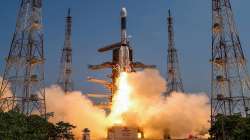New York Times hails India’s space startups' journey under PM Modi
The report highlighted the startups in India with ambitious plans for capitalising on the burgeoning demand of small satellites in low Earth orbits.

With at least 140 registered space-tech startups, India stands to transform the planet’s connection to the final frontier, says The New York Times.
The report highlighted the startups in India with ambitious plans for capitalising on the burgeoning demand of small satellites in low Earth orbits.
The startups featured are Skyroot Aerospace, Dhruva Space and Pixxel, all of which are among a cluster of startups that have been actively and closely working with the Indian Space Research Organisation (ISRO).
“Suddenly India has become home to at least 140 registered space-tech start-ups, comprising a local research field that stands to transform the planet’s connection to the final frontier. It’s one of India’s most sought-after sectors for venture capital investors,” according to the report.
“The startups’ growth has been explosive, leaping from five when the pandemic started. And they see a big market to serve,” it added. The government has opened up the space sector for private players.
Earlier this year, ISRO and Microsoft on Thursday announced a collaboration to fuel the growth of space technology startups in the country.
Last month, during Prime Minister Narendra Modi's state visit to the US, the White House said that Modi and US President Joe Biden “called for enhanced commercial collaboration between the U.S. and Indian private sectors in the entire value chain of the space economy”.
According to NYT, “both countries see space as an arena in which India can emerge as a counterweight to their mutual rival: China”.
According to the joint statement, Biden and Modi set a course to reach new frontiers across all sectors of space cooperation. The leaders applauded growing cooperation on earth and space science, and space technologies.
"They welcomed the decision of NASA (National Aeronautics and Space Administration) and ISRO to develop a strategic framework for human spaceflight cooperation by the end of 2023," the statement read.
Modi and Biden called for enhanced commercial collaboration between the US and Indian private sectors in the entire value chain of the space economy and to address export controls and facilitate technology transfer.
ALSO READ | 'Clocks' reveals time in early universe was five times slower

